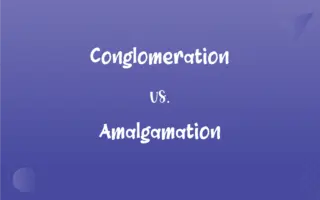Master vs. Magister: What's the Difference?
Edited by Aimie Carlson || By Janet White || Updated on November 10, 2023
Master refers to a person with control or authority, or skilled in a field. Magister refers to a title in academic or judicial contexts, often historical.

Key Differences
Master is a versatile term used to denote someone with control, authority, or exceptional skill in a specific area. It can refer to a teacher, an expert, or a ruler. Magister, in contrast, is a specific academic or judicial title, historically used in Europe, often implying a high level of expertise or authority in a particular field.
The term master is widely used in various contexts, from educational ('master's degree') to professional ('master craftsman'). It implies proficiency and dominance. Magister, however, is less commonly used in modern times and is often associated with historical or ceremonial roles, particularly in European academic and legal traditions.
Master can also imply ownership or the power to command, as seen in historical contexts like 'master of a house' or 'slave master'. In contrast, Magister has a more scholarly connotation, historically used to address or refer to teachers, professors, or judges, indicating respect and expertise.
In contemporary use, master has evolved to represent high achievement (as in 'master's degree') or skill level (as in 'chess master'). Magister remains a more archaic term, often found in historical or classical references, emphasizing a formal and academic distinction.
While master has a broader application and is commonly understood in various contexts, magister is specialized and more likely to be encountered in academic, legal, or historical texts, representing a formal title or position of authority.
ADVERTISEMENT
Comparison Chart
Definition
Person with control, authority, or skill
Academic or judicial title
Usage Context
Various (education, profession, control)
Academic, legal, historical
Connotation
Skill, authority, ownership
Scholarly, formal, historical
Modern Usage
Common and diverse
Less common, more specific
Historical Context
Broader historical use
Specific to academic and legal roles
ADVERTISEMENT
Master and Magister Definitions
Master
Someone in charge or control.
She is the master of the vessel.
Magister
A historical academic title in European universities.
Dr. Jones was known as a magister in medieval studies.
Master
A higher degree in education.
She completed her master's degree in English.
Magister
A title denoting high expertise or authority.
As a magister in philosophy, he was highly respected.
Master
An original, as in a master copy.
The master recording was used for duplication.
Magister
A teacher or master in a scholarly field.
The magister lectured on ancient Roman law.
Master
A person with exceptional skill in a particular field.
He is a master in martial arts.
Magister
Used historically in reference to a scholar or jurist.
The writings of the magister are still studied today.
Master
A title for a male teacher or academic.
Mr. Smith is the master of the science department.
Magister
A judicial title in historical contexts.
The magister presided over the court.
Master
The owner or keeper of an animal
The dog ran toward its master.
Magister
Master; sir: a title used in the Middle Ages, given to a person in authority, or to one having a licence from a university to teach philosophy and the liberal arts.
Master
The owner of a slave.
Magister
The possessor of a master's degree.
Master
One who has control over or ownership of something
The master of a large tea plantation.
Magister
Master; sir; - a title of the Middle Ages, given to a person in authority, or to one having a license from a university to teach philosophy and the liberal arts.
Master
An employer.
Master
The man who serves as the head of a household.
Master
One who defeats another; a victor
I had to admit that I had met my master and so conceded the game.
FAQs
Is magister still used today?
Rarely, it's mostly historical or ceremonial.
Are master and magister interchangeable?
No, they have different contexts and connotations.
Can master be used for both genders?
Yes, master is gender-neutral in modern usage.
Were magisters involved in governance?
In historical contexts, they sometimes had judicial roles.
Is the term master culturally sensitive?
In some contexts, due to historical associations with slavery.
What does master mean?
It refers to a person with expertise, authority, or control.
What is a magister?
A historical academic or judicial title.
What is a master's degree?
An advanced academic degree.
Is magister a legal title?
Historically, it was used in legal contexts.
What does a master craftsman imply?
A high level of skill in a craft.
How is master used in professions?
It denotes high skill level (e.g., master carpenter).
Can anyone be called a master?
Typically, it's reserved for those with expertise or authority in a field.
Did magister imply teaching roles?
Yes, it often referred to teachers or scholars.
Was magister used outside of Europe?
Primarily a European term, less so elsewhere.
Is magister related to magistrate?
They have different origins and meanings.
Can master imply ownership?
Historically, yes, but less so in modern contexts.
Does magister have a religious connotation?
Sometimes, especially in historical ecclesiastical roles.
Does master imply a learning process?
Often, especially in educational contexts.
What field is magister most associated with?
Academic and scholarly fields.
Can master be a verb?
Yes, as in 'to master a skill'.
About Author
Written by
Janet WhiteJanet White has been an esteemed writer and blogger for Difference Wiki. Holding a Master's degree in Science and Medical Journalism from the prestigious Boston University, she has consistently demonstrated her expertise and passion for her field. When she's not immersed in her work, Janet relishes her time exercising, delving into a good book, and cherishing moments with friends and family.
Edited by
Aimie CarlsonAimie Carlson, holding a master's degree in English literature, is a fervent English language enthusiast. She lends her writing talents to Difference Wiki, a prominent website that specializes in comparisons, offering readers insightful analyses that both captivate and inform.






































































